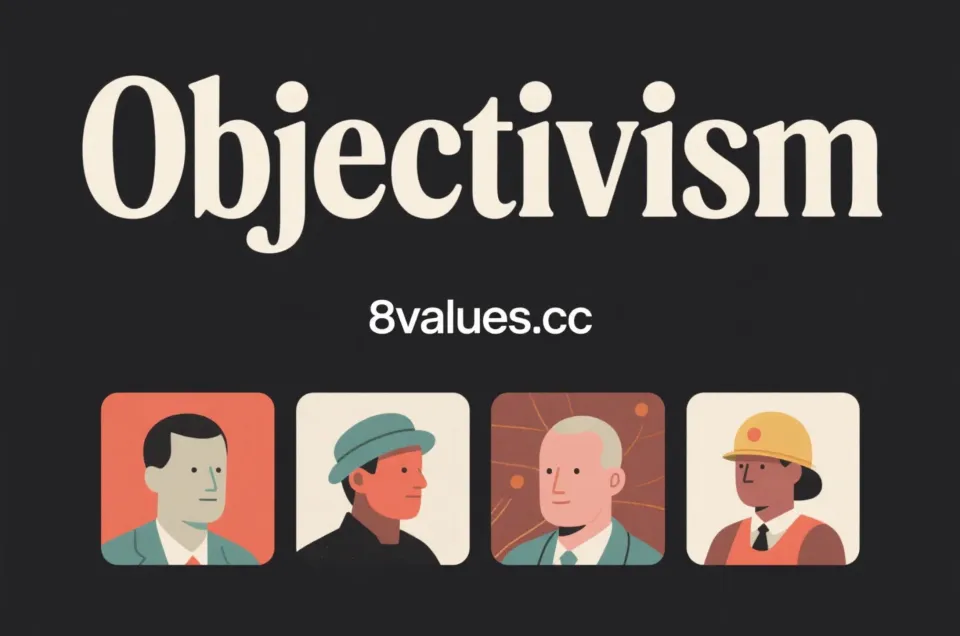Objectivism | 8values Interpretation of ideological ideology of political test
A thorough interpretation of Ayn Rand's "objectivist" philosophical system and explore its core propositions in metaphysics, epistemology, ethics and political philosophy. This article aims to fully illustrate key concepts such as objective reality, rational self-interest, laissez-faire capitalism and individual rights, help you understand this highly controversial and far-reaching ideology and understand its place in the political spectrum through the 8 values political test.
Ayn Rand (Ann Rand, 1905-1982), a Russian-American writer and philosopher, founded a comprehensive philosophical system called Objectivism. It integrates core propositions in multiple fields such as metaphysics, epistemology, ethics, political philosophy and even aesthetics, and provides a complete set of guiding principles for how individuals survive on the earth. Rand once summarized objectivism as "a person as a heroic existence, with his own happiness as the moral purpose of life, fruitful achievements as the noblest activity, and rationality as the only absolute principle." For individuals who obtain "objectivist" results in the 8 values political test , understanding the depth and breadth of this philosophical thought is the cornerstone of exploring their own political tendencies and values.
Ayn Rand and the Origin and Development of Objectivist Philosophical System
Ayn Rand, formerly known as Alissa Rosenbaum, was born in St. Petersburg, the Russian Empire. Her childhood experiences through World War I and the subsequent Russian Civil War, as well as the real communist regime, have deeply shaped her firm anti-communist worldview. After graduating from college, Rand went to the United States and fell in love with his spirit of freedom at first sight, eventually successfully gaining residency and becoming a U.S. citizen.
Her philosophical thoughts were initially presented mainly through novel works, the most famous of which were The Fountainhead (1943) and Atlas Shrugged (1957). These works not only achieved great commercial success, but also made Rand widely known when he was alive and regarded as the "great prize" for philosophers. Rand then further illuminates and develops her philosophy through nonfiction articles and books such as For the New Intellectual: The Philosophy of Ayn Rand (1961), America's Persecuted Minority: Big Business (1962), and The Virtue of Selfishness: A New Concept of Egoism (1964). She also founded publications such as The Objectivist Newsletter and The Objectivist to spread her ideas.
The origin of the name "Objectivism" is also quite meaningful. Rand originally believed that “existentialism” was more suitable for her philosophy because it emphasized the metaphysics of existence and the moral goal of maintaining individual existence. However, because existential philosophers such as Jean-Paul Sartre had already used this name and developed a very different viewpoint, Rand ended up choosing “objectivism.” This name emphasizes the objectivity of human knowledge and values: they are not created out of thin air by human thoughts, but are determined by the essence of reality and discovered by human thoughts.
The core concept of Objectivism: In-depth interpretation of the pillars of philosophy
Objectivism is a philosophical system covering a wide range, and its core ideas can be understood from five main branches: metaphysics, epistemology, ethics, political philosophy and aesthetics.
Metaphysics: Firm belief in objective reality
The metaphysics of objectiveism is the cornerstone of its entire philosophical system, and it firmly believes that reality exists objectively and is independent of human consciousness, emotion, desire, hope or fear. Facts are facts and do not change due to subjective intentions.
Rand's metaphysics is based on three basic axioms:
- Existence exists : confirms that something exists. This axiom is self-evident, and anyone who tries to deny it must first accept it, because the existence of the negator itself proves the existence of existence.
- Consciousness exists : Awareness of the existence of "existence" proves the existence of consciousness. Consciousness is the ability to perceive existence, which itself cannot be defined or conceptualized from a reality independent of it.
- Existence is Identity : All things that exist have identity, that is, they have qualities or attributes that define their "what is". This can be simply understood as "A is A". It emphasizes the specific nature of things, and things without properties or attributes cannot exist.
Objectivism also believes that the law of causality is a deduction of the law of identity. Things act in a way consistent with their categories, and the way an entity acts is determined by its substance nature. Furthermore, objectivism completely excludes any belief that transcends existence, such as transcendence, sacredness or mysticism. It argues that consciousness is not a creation of reality, but a tool for perceiving and understanding reality.
Theory of Ethics: Reason as the only cognitive tool and a way to acquire knowledge
In terms of epistemology, objectivism emphasizes that rationality is the only means for humans to perceive reality, the only source of knowledge, the only guide to action, and the basic way of survival. Rand defines rationality as “the ability to identify and integrate the material provided by the human senses.”
The process of Objectivism's knowledge acquisition starts with sensory perception, and through concept formation and induction logic, the information received by the senses is transformed into knowledge. It firmly opposes philosophical skepticism and denies the acquisition of knowledge through faith, revelation or emotion. Rand argues that although emotions are important to humans, they are the result of consciousness or subconscious ideas, rather than a way to perceive reality. Ration must always be dominant.
Rand's epistemology elaborates on concept formation in detail, and she proposes that concepts are formed through the process of "measurement omission" . This means that when forming concepts, we omit their specific measurements from similar concrete things, thus integrating a single psychological unit. For example, the concept of "dog" does not refer to a dog of a certain size, fur color or breed, but covers all animals with common characteristics of "dog". This concept is open and can be expanded and improved as new knowledge is acquired.
Objectivist epistemology rejects analysis-the possibility of comprehensive distinction and prior knowledge . She believes that all knowledge is ultimately based on perception, and that the effectiveness of the senses is axiomatic and cannot be proved or denied. Perception itself does not make mistakes, and the error lies in the conceptual recognition of perception.
Ethics: The virtue of rational selfishness and selfishness
The core of ethics of objectiveism lies in rational self-interest, and advocates that the pursuit of personal happiness is the highest moral purpose of life. Rand clearly states that "a man is his own end, not a tool for others' purposes. He must exist for himself, neither sacrifice himself to others nor sacrifice others to himself."
Rand believes that life itself is the ultimate standard of all values, and reason is the basic tool for human survival. Therefore, reason , purpose and self-esteem are the three most important value criteria in human life. A person must use reason by choosing to think or not , and use it to guide his actions and values.
One of the most controversial but also famous aspects of the ethics of objectiveism is that it regards selfishness as a virtue and altruism as a evil deed . The altruism defined by Rand refers to the "moral obligation to live for others" proposed by Auguste Comte, which is to sacrifice individual interests to serve others. She believes that this kind of "selfless love" is not only immoral, but even impossible, because when love has no standards and value, in fact, no one loves it. Rand stressed that the “rational self-interest” she advocated is not “willfulness without self” or hedonism, which is based on blind desires and impulses, rather than rational judgments. Rational self-interest is based on respect for reality and understanding of one's own human nature and needs.
She believes that tyranny in history, such as the communism of the Soviet Union and Nazi Germany, were all under the banner of "self-sacrifice" and collectivism to destroy humanity. The early prosperity of the United States was based on personal achievements and self-worth.
Political Philosophy: Laissez-faire Capitalism and the Defence of Individual Rights
Objectivist political philosophy is an extension of its ethics at the social level, and its core is the concept of individual rights . Rand believes that “right is a moral principle that defines and approves human freedom of movement in society”. Objectivism advocates that only individuals have rights, and no "collective rights" can exist without reducing individual rights.
The most basic right of human beings is the right to survive , which means that people have the right to take action to promote their own lives, rather than requiring others to involuntarily provide them with security for survival. Extending property rights from the right to survival means that individuals have the right to own labor products obtained through their own efforts. Therefore, under no circumstances can a person's right to survive include the right to dispose of other people's property.
Objectivism advocates that the ideal political and economic system is laissez-faire capitalism . This is a system of mutual exchanges between people as "traders" rather than "victims and executioners" or "masters and slaves", achieving mutual benefit through free and voluntary exchanges. In such a system, no one should obtain value from others by resorting to force, nor should he take the initiative to use force against others. The only function of the government is to act as a "police" to protect the rights of citizens and to retaliate with force only when dealing with criminals or foreign invaders.
Rand firmly advocates for the complete separation of the state and the economy , just as the separation of the state and the church. She opposed any form of collectivism or the "mixed economic" system of state intervention in the economy, believing that these systems weaken individual rights and freedoms. Capitalism is moral not only because it operates efficiently, but also because it fundamentally respects individual creativity and freedom, and is the only social system that can allow human beings to flourish and develop.
Aesthetics: The artistic expression of romantic realism
Objectivist aesthetic theory stems directly from its epistemology, especially what Rand calls psychological-ethics theory , that is, to study the way consciousness and subconsciousness interact in human cognition. Objectivists believe that art is a basic need for human cognition, which allows humans to understand abstract concepts in sensual and concrete forms.
Rand defines art as “selective recreation of reality based on the artist’s metaphysical value judgment.” This means that artists selectively reshape reality based on their own understanding of the ultimate importance and authenticity of reality and human nature. The function of art is to provide a sensible, easy-to-master way to convey and think about a wide range of abstract concepts, including individual metaphysical value judgments. Art is not a propaganda tool, but an expression of values and ideals.
In terms of artistic style, objectivism advocates Romantic Realism . This style emphasizes the existence of human will, the effectiveness of rationality, and the achievable goals, in contrast to naturalism that devalues human will and values. Rand believes that romanticism is the highest school of literature and art because it recognizes the principle that human beings possess willpower and puts values first. However, she also distinguishes true romanticism from emotionalism that uses emotions as the basis of decision-making, which objectiveism firmly opposed.
The philosophical origins and unique features of objectiveism
Although objectivism is an independent philosophical system, when constructing it, Rand also absorbed historical philosophical ideas and made unique criticism and development.
The influence of Aristotle and Locke
Rand's philosophical view was greatly influenced by Aristotle . She believed that Aristotle's definition of logic and the way human knowledge was acquired was a great achievement. In metaphysics, Rand's objective reality theory has similarities with Aristotle's metaphysics. In epistemology, the view that information is acquired through the senses and transformed into concepts also has similarities with Aristotle's empiricism. In ethics, Rand's theory of virtue also carries traces of Aristotle, and his "rational self-interest" is related to Aristotle's concept of "happiness" (eudaimonia).
In addition, Rand was also influenced by John Locke 's theory of personal rights. Locke conceptualizes the ideal of "owning oneself" and advocates the individual's natural right to life, freedom and pursuit of happiness, as well as the right to own products produced by his labor. These ideas are reflected in the objectiveist claims of individual rights and property rights.
Comparison and criticism with other philosophical thoughts
Despite the influence of Aristotle, there are differences between objectivism and Aristotle at certain key points, most notably that objectivism is atheistic philosophy , and Aristotle believes that a certain divinity exists. Rand also strongly criticized Kant's prior philosophy , believing it is contrary to the objectivist view of reality.
There is a complex relationship between objectivism and libertarianism . Although the two have common ground in terms of political goals, such as supporting individual freedom and free markets, Rand himself and many "orthodox" objectivists do not agree with liberal willism. Rand believes that liberalism is just a political philosophy and lacks a complete philosophical basis, so its supporters may be motivated by irrationality (such as pursuing legalization for the abuse of drugs), while objectivism is a complete system covering all branches of philosophy, including metaphysics, epistemology, ethics, etc. In the eyes of objectivists, libertarians may appear as "self-destructive depraved", while objectivists may be regarded by libertarians as "moral preaching diehards." Rand once said that liberalists “plagiarized” the objectivist claims and even believed that “it was like pulling out the teeth.”
Rand also objected to the American conservatives ’ defense of the free market. Conservatives tend to doubt the morality of the market based on religious beliefs and support it simply because the market is “effective”. Objectivists believe that capitalism itself is a moral system, and its effectiveness is just a coincidence. Rand believes that conservatives “surrendered” to their opponents philosophically and sowed the seeds of their own destruction.
Objectivism also completely excludes any form of determinism and opposes the view of human beings as victims dominated by external forces such as God, destiny, environment, or genes. It emphasizes that humans are creatures with free will and rational abilities, and individuals are fully responsible for their lives and personalities.
The influence of Objectivism and contemporary reflection
Since its birth, objectivism has had a profound impact on American society with its distinctive position and unique ideological system.
Attraction to the younger generation and the response of academia
Rand's philosophy, especially her work, has a particularly strong attraction to young people in the "shaping period". Onkar Ghate of Ayn Rand Institute also believes that objectivism “attracts the idealism of young people.” This attraction can sometimes cause concern among critics. Many young people may later give up their positive views of Rand and are considered to have “beyond” her thoughts, but Rand’s supporters believe this is due to their loss of youthful idealism and inability to resist society’s pressure on intellectual consistency.
However, in mainstream academic circles , objectivism is often coldly accepted and even directly refuted. Many scholars and academic philosophers refuse to recognize objectivism as a legitimate philosophy and oppose its inclusion in academic curriculum. This is partly because most of Rand's nonfiction works are published in non-academic, non-peer-reviewed journals rather than traditional academic journals. Some critics believe Rand is a superficial thinker who attracts only teenagers. But there are also opinions that regarding her as a "introduction drug" for right-wing politics ignores her importance.
Nevertheless, objectivism maintains a persistent influence among liberal and conservative Americans. Ayn Rand Society is committed to promoting academic research on objectivism and works with the Oriental Chapter of the American Philosophy Association. Some scholars believe that objectivism is a unique defense of classical liberalism and deserves academic debate.
Objectivist movement and future development
After Ayn Rand's death, her designated heir to knowledge and law, Canadian-American philosopher Leonard Peikoff, worked to provide a more formal structure for objectivist ideas. Peikoff describes objectivism as a "closed system" whose basic principles are established by Rand and cannot be changed. However, he also pointed out that objectivism allows "new meanings, applications and integration" to be constantly discovered.
The Objectivist movement was founded by Rand himself to spread its ideas to the public and academic circles. Many scholars and writers have developed and applied Rand's ideas to more specific fields, such as epistemology, ethics, political economy, and psychology. Despite differences in the debate between "open objectivism" and "closed systems", objectivism, as a coherent philosophical system, continues to attract and inspire new followers.
Conclusion: Understanding the far-reaching significance of objectiveism and your political stance
Objectivism, as the philosophical system founded by Ayn Rand, provides a comprehensive perspective on reality, knowledge, morality, politics and aesthetics. It constructs a unique world of thought with its firm belief in objective reality , its supremacy of rationality , its moral code of self-interest , and its laissez-faire capitalist political proposition.
Exploring these core concepts of objectivism is crucial for individuals who want to have a deep understanding of personal values and political stances. It not only challenges many traditional moral and social concepts, but also provides a powerful philosophical defense for individual freedom, productive achievements and self-happiness.
If you want to further explore your position in the political spectrum and understand how well you fit with objectiveist ideas, try the 8values political test . This test can help you clarify your ideological tendencies and provide a detailed interpretation of the 52 ideologies in total , including objectivism, to better understand this complex and fascinating political philosophy. Through the political spectrum coordinate analysis tool , you can also intuitively see your positioning in a multi-political dimension. In addition, you can find more articles on political theory and its real-life applications in our blog . A deeper understanding of objectivism may bring you deeper thoughts about individuals and society.






